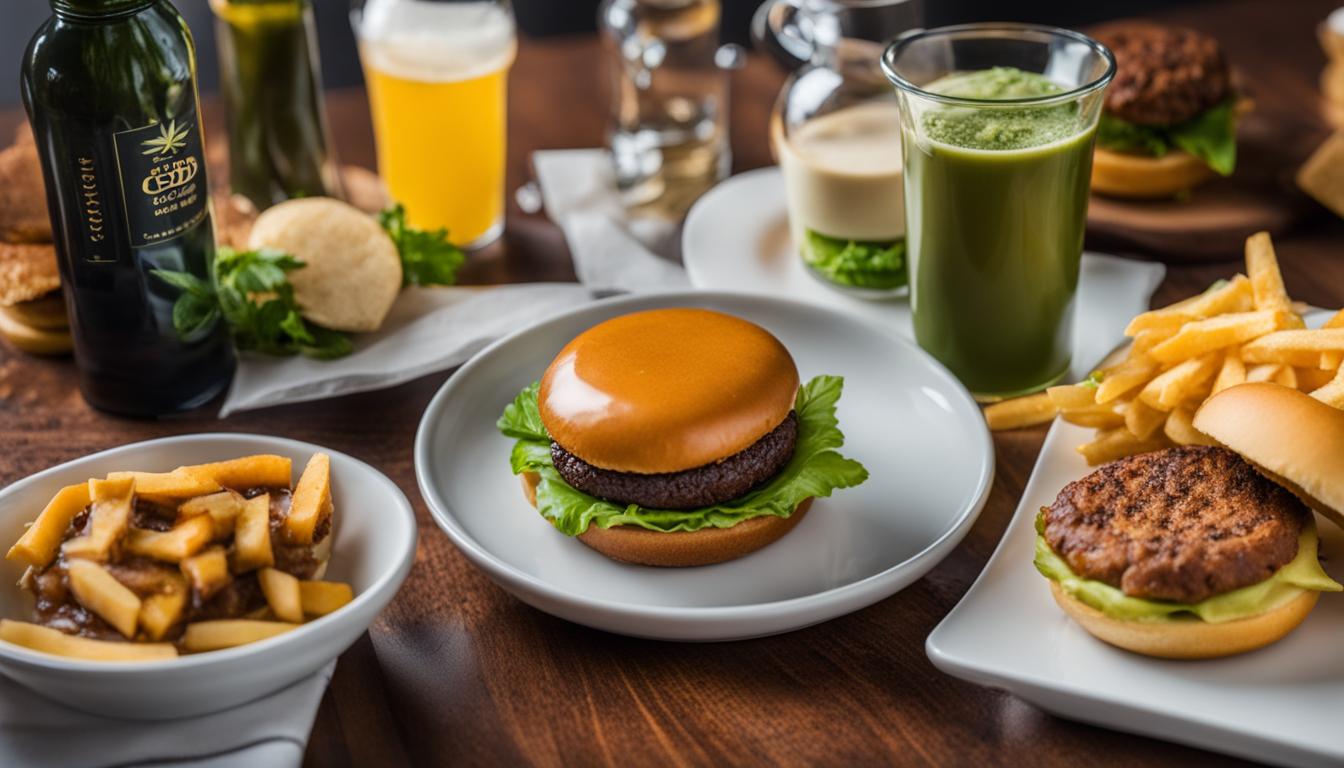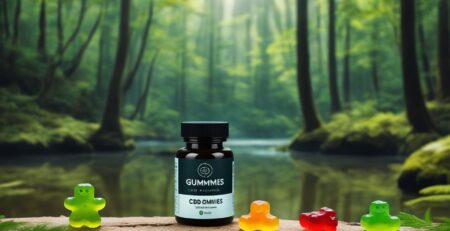Understanding Legal Considerations: CBD in Food Products in the US
The legal landscape surrounding CBD in food products in the United States is complex and evolving. It is crucial for businesses to understand the legal considerations and comply with the regulations set by the Food and Drug Administration (FDA). This article aims to guide you through the legal aspects of CBD in food products and provide insights to help you stay compliant in this industry.
Key Takeaways:
- Compliance with FDA regulations is essential for businesses selling CBD-infused food products.
- State-specific regulations vary, and businesses must understand and adhere to them.
- Proper labeling, marketing restrictions, and product safety are key considerations for CBD food products.
- Staying informed about potential future changes in CBD regulations is crucial.
- Businesses can navigate the legal landscape by following best practices and prioritizing compliance.
FDA Regulations for CBD in Food Products
The legal landscape surrounding CBD in food products in the United States is complex and evolving. As businesses navigate this industry, it is crucial to understand and comply with the regulations set by the Food and Drug Administration (FDA). The FDA is responsible for regulating CBD in food products; however, there is currently no comprehensive regulatory framework in place.
In the absence of clear regulations, businesses selling CBD-infused food products must navigate various guidelines and requirements set by the FDA. These include compliance with labeling requirements, marketing restrictions, and ensuring product safety. Staying updated with the latest FDA guidelines is essential to ensure compliance and avoid legal issues.
Proper labeling of CBD-infused food products is crucial to comply with FDA regulations and provide consumers with accurate information. The FDA requires clear and accurate labels that include the amount of CBD per serving, ingredients list, nutritional information, and potential allergens. Labels must not make misleading claims or promote CBD as a treatment for medical conditions.
Marketing restrictions for CBD food products are in place to protect consumers and prevent misleading claims. The FDA prohibits marketing CBD as a dietary supplement or ingredient in conventional food products. Making unsubstantiated health claims or promoting CBD as a cure for medical conditions is also not allowed. Adhering to these marketing regulations is important to avoid legal issues and protect consumers.
| FDA Regulations | Compliance Requirements |
|---|---|
| Labeling | Clear and accurate labels with CBD amount, ingredients, and allergen information |
| Marketing | Avoiding misleading claims and promoting CBD as a dietary supplement or cure for medical conditions |
| Product Safety | Testing for contaminants and ensuring adherence to good manufacturing practices |
Businesses must also prioritize product safety by conducting appropriate testing for contaminants such as pesticides, heavy metals, and microbial contaminants. Working with reputable suppliers and manufacturers that follow good manufacturing practices is important in ensuring the safety of CBD-infused food products.
While the FDA regulates CBD in food products at the federal level, it's important for businesses to understand that regulations may vary from state to state. Some states have embraced CBD and enacted favorable regulations, while others have stricter regulations or outright bans on CBD-infused food products. It is essential for businesses to understand and comply with the specific regulations in each state where they operate or sell their products.
Current State of CBD Regulations
The regulatory landscape for CBD in food products in the United States is constantly evolving, with varying laws and regulations from state to state. While some states have embraced CBD and enacted favorable regulations, others have stricter regulations or outright bans on CBD-infused food products. It is essential for businesses in this industry to have a thorough understanding of the specific regulations in each state where they operate or sell their products, to ensure compliance and avoid legal consequences.
State Regulations and Restrictions
Each state has the authority to regulate CBD in food products within its jurisdiction. Some states have implemented comprehensive regulations that outline specific requirements for labeling, packaging, marketing, and safety of CBD-infused food products. These regulations may include restrictions on the concentration of CBD, licensing requirements, and third-party testing. Other states have taken a more restrictive approach, prohibiting the sale or production of CBD-infused food products altogether.
It is crucial for businesses to stay up to date with the latest regulations in each state where they operate. This may involve regularly monitoring changes in legislation, maintaining open communication with state regulatory agencies, and seeking legal counsel to ensure compliance with state-specific requirements.
The Role of the FDA
While individual states have the authority to regulate CBD in food products, the Food and Drug Administration (FDA) also plays a significant role. The FDA has not yet established a clear regulatory framework for CBD in food products, which has created ambiguity and challenges for businesses in this industry.
However, the FDA has issued warning letters to companies making unsubstantiated health claims about CBD products and continues to evaluate the safety and effectiveness of CBD. It is important for businesses to comply with FDA guidelines and ensure that their CBD-infused food products are safe and accurately labeled.
CBD Labeling Requirements: Ensuring Compliance and Consumer Safety
Proper labeling is a critical aspect of CBD-infused food products to comply with legal requirements and provide consumers with accurate information. The FDA has set specific guidelines for labeling CBD food products, aiming to protect consumer safety and prevent misleading claims.
According to the FDA, CBD food product labels must include essential information such as the amount of CBD per serving, a comprehensive list of ingredients, nutritional information, and any potential allergens. It is important to ensure that these labels are clear, accurate, and do not make unfounded health claims or promote CBD as a treatment for medical conditions.
Additionally, businesses should prioritize transparency and consumer safety by providing clear information about the sourcing and manufacturing processes of their CBD-infused food products. This includes details on the quality control measures implemented to ensure product safety and compliance with FDA regulations.
The Importance of Accurate CBD Labels
“Clear and accurate labels enable consumers to make informed decisions about the CBD products they purchase and consume,” says Dr. Jane Thompson, a regulatory expert in the CBD industry.
Accurate CBD labels empower consumers to understand the potency of CBD in a product, identify potential allergens, and make informed choices based on their dietary or medical needs. This transparency also helps establish trust between businesses and consumers, fostering a positive reputation in the CBD industry.
Meeting the Labeling Requirements: Best Practices
To ensure compliance with CBD labeling requirements, businesses should consider implementing the following best practices:
- Thoroughly review the FDA guidelines for labeling CBD food products and consistently update labels based on any regulatory changes.
- Work with experienced legal professionals knowledgeable in CBD regulations to ensure accurate and compliant labels.
- Perform regular internal audits to verify that all CBD food products are labeled correctly and in accordance with FDA requirements.
- Access third-party testing services to validate the accuracy of CBD potency claims and confirm the absence of harmful contaminants.
By adhering to these best practices, businesses can navigate the complex landscape of CBD labeling requirements, maintain compliance, and prioritize consumer safety in the rapidly growing CBD-infused food product market.
| Labeling Requirements | Compliance Tips |
|---|---|
| Include the amount of CBD per serving | Use accurate measurements and ensure consistency across products |
| List all ingredients | Double-check ingredient lists for accuracy and disclose any potential allergens |
| Provide nutritional information | Calculate and display accurate nutritional values based on serving sizes |
| Avoid misleading health claims | Ensure marketing language focuses on general wellness rather than specific medical benefits |
CBD Marketing Restrictions: Navigating Legal Boundaries
When it comes to marketing CBD food products, businesses face a range of restrictions to ensure compliance with legal requirements and protect consumers. The Food and Drug Administration (FDA) has set guidelines to prevent misleading claims and maintain product safety. Understanding and adhering to these marketing restrictions is crucial for businesses operating in the CBD industry.
One of the key restrictions imposed by the FDA is the prohibition of marketing CBD as a dietary supplement or as an ingredient in conventional food products. This means that businesses cannot promote CBD-infused food products as having health benefits or as a treatment for medical conditions. Making unsubstantiated claims about the therapeutic properties of CBD can lead to legal consequences and damage the reputation of the business.
In addition to avoiding health claims, businesses must ensure that their marketing materials do not make false or misleading statements about the CBD content of their products. The FDA requires clear and accurate labeling of CBD-infused food products, including the amount of CBD per serving. Marketing materials should align with these labeling requirements to provide consumers with consistent information and avoid any confusion or misrepresentation.
| Marketing Restrictions for CBD Food Products | Compliance Strategies |
|---|---|
| Prohibition of health claims | Focus on promoting CBD food products as part of a balanced lifestyle |
| Accurate CBD labeling | Ensure marketing materials align with labeling requirements |
| Avoiding misleading statements | Use transparent and honest language in marketing materials |
| Keeping up with regulatory changes | Regularly review FDA guidelines and adjust marketing strategies accordingly |
“The FDA prohibits the marketing of CBD as a dietary supplement or as an ingredient in conventional food products.”
To comply with these marketing restrictions, businesses should focus on promoting CBD food products as part of a balanced lifestyle rather than making explicit health claims. This can include emphasizing the product's high-quality ingredients, unique flavor profiles, or supporting a sustainable agricultural industry. By highlighting these aspects, businesses can still effectively market their CBD-infused food products while staying within legal boundaries.
Moreover, businesses should maintain transparency and honesty in their marketing materials. Avoiding misleading statements and using clear, straightforward language can build trust with consumers and prevent potential legal issues. Communication should be based on facts and avoid exaggerated or unverifiable claims that could mislead consumers about the benefits of CBD.

Staying Compliant and Proactive
As the CBD industry continues to evolve, it is essential for businesses to keep up with regulatory changes and adjust their marketing strategies accordingly. Regularly reviewing FDA guidelines and staying informed about any updates or clarifications can help businesses stay compliant and avoid legal issues. Additionally, working closely with legal professionals experienced in CBD regulations can provide valuable guidance and ensure that marketing efforts align with established legal boundaries.
By navigating the marketing restrictions for CBD food products and prioritizing compliance, businesses can establish a strong presence in the industry while protecting both their reputation and consumers' safety. Adhering to the guidelines set by the FDA and maintaining transparency in marketing materials will not only ensure legal compliance but also build trust and credibility with consumers.
Ensuring CBD Product Safety
When it comes to CBD-infused food products, ensuring product safety is of utmost importance. As a responsible player in the CBD industry, we prioritize the well-being of our consumers by implementing rigorous measures to guarantee the safety and quality of our products.
To uphold product safety standards, we work closely with reputable suppliers and manufacturers who adhere to strict guidelines and follow good manufacturing practices (GMP). This ensures that our CBD-infused food products are free from harmful contaminants such as pesticides, heavy metals, and microbial contaminants, which can pose risks to consumer health.
Additionally, we conduct thorough testing throughout the production process to verify the safety and purity of our CBD products. These tests are conducted by third-party laboratories, providing an unbiased assessment of the quality and safety of our products.
We understand that consumer trust is built on transparency, which is why we provide detailed information about our testing procedures, including the results of these tests. By prioritizing product safety and transparency, we aim to instill confidence in our customers and reassure them that our CBD-infused food products meet the highest standards of quality and safety.
In conclusion, ensuring CBD product safety is a fundamental aspect of our commitment as a CBD industry player. By working with reputable suppliers, implementing rigorous testing procedures, and providing transparent information to our customers, we strive to deliver CBD-infused food products that are safe, reliable, and of the highest quality.
Government Regulations and Compliance Challenges
The CBD industry operates within a complex regulatory landscape, with government regulations playing a crucial role in shaping its operations. To ensure compliance with CBD government regulations and overcome the associated challenges, businesses must navigate both federal and state-specific requirements. Staying up-to-date with the evolving legal framework and taking proactive measures are essential to avoid legal consequences and maintain ethical operations.
At the federal level, CBD derived from hemp is federally legal under the 2018 Farm Bill. However, individual states have the authority to establish their own regulations and restrictions, which can vary significantly. This creates compliance challenges for businesses operating across state lines, as they need to understand and align with the specific regulations in each jurisdiction.
Obtaining the necessary licenses and permits is a critical aspect of compliance. Depending on the state, businesses may be required to obtain additional permits beyond the standard food business licenses. These permits could include CBD-specific licenses or certifications, such as hemp processor or CBD manufacturing licenses. It is important to research and comply with the specific requirements in each state where you operate or sell CBD-infused food products.
Moreover, businesses need to address compliance challenges related to labeling, packaging, and marketing. Inconsistent regulations across states can make it challenging to ensure compliance with labeling requirements, such as accurately stating the amount of CBD per serving and including proper ingredient lists. Additionally, marketing restrictions imposed by both federal and state authorities require businesses to be vigilant in their promotional efforts and avoid making unsubstantiated health claims or misleading statements.
Overall, navigating the government regulations and compliance challenges in the CBD industry is a multifaceted task that requires thorough research, ongoing monitoring of changes in regulations, and collaboration with legal professionals experienced in CBD regulations. By proactively addressing compliance issues and staying informed about the legal landscape, businesses can operate ethically and maintain a competitive edge in the CBD food products market.

Table: State-Specific CBD Regulations
| State | CBD Legal Status | Specific Regulations |
|---|---|---|
| California | Legal | – CBD-infused food products must be sourced from licensed cannabis businesses – Labeling requirements for CBD content and disclosure of the source |
| Texas | Restricted | – CBD-infused food products must contain no more than 0.3% THC – Age restrictions for purchasing CBD products |
| New York | Legal | – CBD-infused food products must be derived from hemp and have a THC content of less than 0.3% – Proper labeling and disclosure of CBD content |
| Florida | Legal | – CBD-infused food products must be tested for purity and potency by a registered testing laboratory – Labeling requirements for CBD content and potential side effects |
CBD Industry Regulations: Navigating Compliance for Food Products
In the rapidly growing CBD industry, understanding and adhering to regulations is essential for businesses operating in the food product sector. Compliance with CBD industry regulations, including legal requirements and labeling guidelines, ensures the legality and safety of CBD-infused food products. In this section, we will explore the key regulations that businesses need to navigate to maintain compliance in the CBD food products market.
Current CBD Industry Regulations
The legal landscape for CBD in food products is complex, with regulations varying from state to state. Some states have embraced CBD and enacted favorable regulations, while others have stricter rules or bans. It is crucial for businesses to conduct thorough research and understand the specific requirements in each state where they operate. This includes compliance with labeling, packaging, and marketing restrictions, as well as ensuring the safety of CBD-infused food products.
Labeling Requirements for CBD Food Products
Proper labeling is a crucial aspect of compliance with CBD industry regulations. The FDA requires clear and accurate labels for CBD food products, including information on CBD content per serving, ingredients list, nutritional information, and potential allergens. Labels must not make misleading claims or promote CBD as a treatment for medical conditions. Adhering to these labeling requirements not only ensures compliance but also provides consumers with accurate information about the product.
Marketing Restrictions for CBD Food Products
Marketing CBD food products is subject to various restrictions to protect consumers and prevent misleading claims. The FDA prohibits marketing CBD as a dietary supplement or an ingredient in conventional food products. Making unsubstantiated health claims or promoting CBD as a cure for medical conditions is also not allowed. It is crucial for businesses to ensure that their marketing materials and advertisements comply with these regulations to avoid legal issues and protect consumers.
By navigating the CBD industry regulations and complying with legal requirements for CBD food products, businesses can establish a strong foundation for success in this burgeoning market. Keeping up with the evolving regulatory landscape, working with legal professionals experienced in CBD regulations, and prioritizing consumer safety are crucial steps in maintaining compliance and ensuring the long-term viability of CBD-infused food products.
Navigating the Legal Landscape: Best Practices for Businesses
To ensure compliance and minimize legal risks in the CBD industry, businesses must follow best practices that align with the evolving regulations and requirements. By adopting these strategies, companies can navigate the complex legal landscape surrounding CBD in food products.
Thorough Research and Due Diligence
One of the first steps for businesses entering the CBD industry is to conduct thorough research and due diligence. This includes understanding the specific regulations and requirements in each state where the company operates or plans to sell its products. By staying informed about the legal landscape, businesses can tailor their operations to adhere to state-specific mandates and avoid potential legal issues.
Legal Professionals Experienced in CBD Regulations
Working with legal professionals who have experience in CBD regulations is essential to ensure compliance. These experts can provide guidance and advice, helping businesses navigate the complex laws and regulations surrounding CBD in food products. They can assist in reviewing labeling, marketing materials, and advertising campaigns to ensure compliance with FDA guidelines and state-specific requirements.
Accurate and Compliant Labeling
Proper labeling is crucial for CBD-infused food products to comply with regulations and provide consumers with accurate information. Businesses should follow FDA guidelines and state-specific requirements when creating labels for CBD food products. This includes providing clear and accurate information about the CBD content, ingredients, nutritional information, and any potential allergens. Care should be taken to avoid making misleading claims or promoting CBD as a treatment for medical conditions.
Prioritizing Product Safety
Ensuring the safety of CBD-infused food products is not only a legal requirement but also a moral and ethical responsibility. Businesses should work with reputable suppliers and manufacturers that adhere to good manufacturing practices (GMP) and have strict quality control processes in place. Regular testing for contaminants, such as pesticides, heavy metals, and microbial contaminants, should be conducted to ensure product safety and compliance with regulations.
Conclusion
Understanding the legal considerations surrounding CBD in food products is essential for businesses like ours operating in this industry. We must prioritize compliance with FDA guidelines and adhere to CBD industry regulations to ensure our operations are legal and ethical.
By staying informed about the regulations and guidelines set by the FDA and state-specific requirements, we can navigate the complex legal landscape surrounding CBD in food products. This knowledge empowers us to make informed decisions and prioritize consumer safety.
Compliance with FDA guidelines for CBD in food products is crucial for our business. It ensures that our products meet the necessary legal requirements, maintain accurate and compliant labeling, and prioritize consumer safety. As the CBD industry continues to evolve, we must stay updated with the latest regulatory developments and adjust our practices accordingly.
Operating in the CBD food products market requires us to understand and navigate the legal landscape effectively. By following the proper legal considerations, maintaining compliance with FDA guidelines, and adhering to CBD industry regulations, we can ensure the success and longevity of our business.
FAQ
What are the legal considerations for CBD in food products in the US?
The legal landscape surrounding CBD in food products in the United States is complex and evolving. It is crucial for businesses to understand the legal considerations and comply with the regulations set by the Food and Drug Administration (FDA).
Who is responsible for regulating CBD in food products in the US?
The FDA is responsible for regulating CBD in food products in the United States. However, the FDA has not yet established a clear regulatory framework for CBD in food products.
Are there specific requirements for labeling CBD food products?
Yes, CBD food products must have clear and accurate labels that include information such as the amount of CBD per serving, ingredients list, nutritional information, and any potential allergens. Labels should not make misleading claims or promote CBD as a treatment for medical conditions.
What restrictions are in place for the marketing of CBD food products?
The FDA prohibits the marketing of CBD as a dietary supplement or as an ingredient in conventional food products. Making unsubstantiated health claims or promoting CBD as a cure for medical conditions is also not allowed.
How can businesses ensure the safety of CBD-infused food products?
Businesses should work with reputable suppliers and manufacturers that adhere to good manufacturing practices (GMP) and have proper quality control processes in place. This includes conducting appropriate testing for contaminants.
How do state-specific regulations impact CBD in food products?
The regulatory landscape for CBD in food products varies from state to state in the United States. Some states have embraced CBD and enacted favorable regulations, while others have stricter regulations or outright bans on CBD-infused food products.
What challenges do businesses face in complying with CBD regulations?
The evolving nature of government regulations surrounding CBD in food products presents compliance challenges for businesses. CBD is legal at the federal level, but individual states may have different regulations and restrictions.
Are there potential future changes in CBD regulations?
The FDA is actively exploring potential regulatory pathways and considering updates to its regulations. This may include establishing clearer guidelines for CBD in food products and addressing issues such as dosing, safety standards, and claims made by manufacturers.
What are the best practices for businesses to stay compliant with CBD regulations?
Best practices include conducting thorough research on state-specific regulations, working with legal professionals experienced in CBD regulations, maintaining accurate and compliant labeling, and prioritizing product safety through quality control measures.
Source Links
- https://www.fda.gov/news-events/public-health-focus/fda-regulation-cannabis-and-cannabis-derived-products-including-cannabidiol-cbd
- https://www.bigcommerce.com/articles/selling-cbd-online/cbd-legal-trends/
- https://www.pbs.org/newshour/science/is-cbd-legal-heres-what-you-need-to-know-according-to-science











Leave a Reply